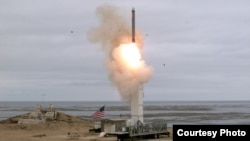Story updated on Aug. 20 at 5:50 am.
Russia on Tuesday criticized the United States for testing a ground-based missile that until three weeks ago had been banned under an arms treaty between the two nations.
"The United States has obviously taken the course of escalating military tensions," Russian Deputy Foreign Minister Sergei Ryabkov said, according to the state-run TASS news agency.
Ryabkov said Russia would not be drawn into a "costly arms race."
His comments came a day after the Pentagon announced the test.
The missile, launched Sunday at San Nicolas Island, California, "accurately impacted its target after more than 500 kilometers of flight," the Pentagon announced in a news release Monday.
"Data collected and lessons learned from this test will inform the Department of Defense's development of future intermediate-range capabilities," it added.
The United States previously was unable to pursue ground-based missiles with a range of 500 to 5,500 kilometers because of the Intermediate-Range Nuclear Forces (INF) Treaty, a decades-old arms control pact with Russia.
Washington withdrew from that pact on Aug. 2, citing years of Russian violations.
The Pentagon stressed that the cruise missile was configured to carry a conventional payload, not a nuclear weapon.
New Secretary of Defense Mark Esper has said that if the U.S. military develops a fully operational mobile ground-launched cruise missile system, he wants to see American ground-based intermediate-range conventional missiles deployed to Asia.
Speaking to reporters earlier this month on his first international trip as head of the Defense Department, Esper said the weapons were important due to the "the great distances" covered in the Indo-Pacific region.
"It's about time that we were unburdened by the treaty and kind of allowed to pursue our own interests, and our NATO allies share that view as well," Esper said.
He declined to discuss when or where in Asia the missiles could be deployed until the weapons were ready, but said he hoped the deployments come within months.
While analysts have primarily focused on what the INF treaty withdrawal means for signatory nations Russia and the United States, the change also allows the United States to strengthen its position against China.
Esper said more than 80 percent of China's missile inventory has a range of 500 to 5,500 kilometers.





